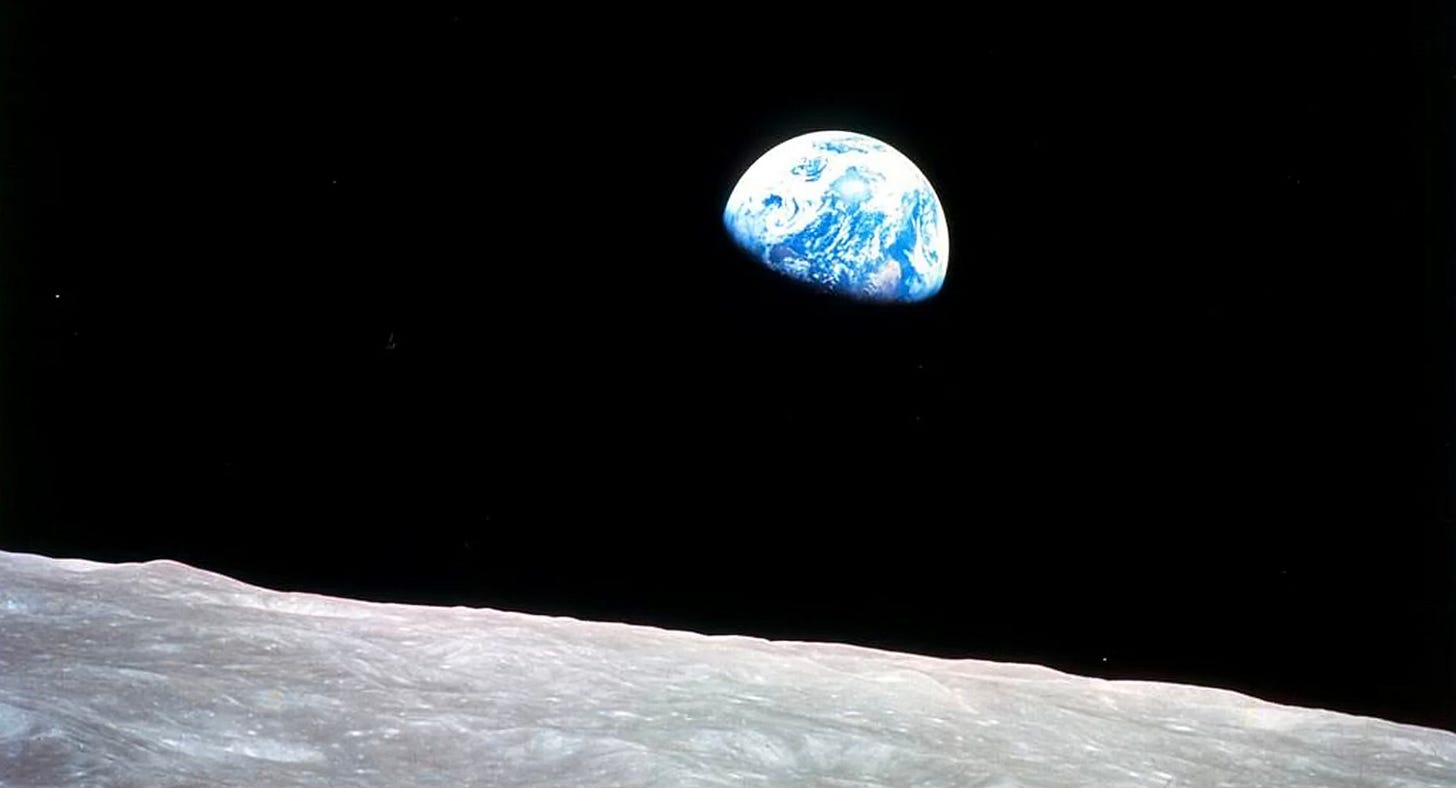Being wrong, feeling good
Promoting conspiracies and other rhetorical tricks. And zombies.
I have two bathroom scales. I don’t know why, but there they are, side by side on the bathroom floor. One is analog with a red line through the center of a little window, and the numbers spin across the window to indicate my weight. The other scale is digital, and flashes its verdict to the second decimal place. The digital is more accurate. The analogue weighs on the light side.
I use the analog. It just feels better. I like to think the consequences are minimal. If I am fooling anyone, it is only myself.
How aware am I, really, of all the times I fool myself with a convenient answer, a snap judgment that feels good, but might not be accurate? Probably more times than I would like to admit.
This got me pondering the question: What is it like to believe in something that most other people view as verifiably wrong?
Flat-earthers come to mind. I have talked about them in an earlier post (The Earth is Flat: a look at epistemic honesty, May 15). According to a 2018 YouGov survey, about 4% of the U.S. population believe the earth is flat. In order to keep believing this, they have to perform the most amazing mental gymnastics, such as asserting that every aspect of the space program — ours and any other nation’s — is part of a massive cover-up, and that “Globe-ists” (their term for the non-believers) are brainwashed by all the mainstream systems.
Eric Dubay, one of the most influential Flat-earthers or “Flerfs” (our term for them) implores us to consider that we all are deceived, and therefore not open to seeing the truth about the nature of our world:
I certainly understand the reluctance of most people to challenge the mainstream view, given the social pressure of being labeled as conspiracy theorists. It is extremely difficult to introduce these ideas to others, which assert that we have been misled to a level this extreme about the true nature of earth and cosmology. But I implore you to do just that.
Jason Ledanye is a master card magician who puts out short videos on YouTube. Unbelieving critics send text messages accusing him of cheating, or tampering with the video, or using a green screen or special cards to pull off his amazing feats of legerdemain. In one video short he put it this way:
I absolutely love ignorance and confidence together. Just because you don’t understand something doesn’t mean it’s fake.
Which brings us to those who believe that the conduct of scientific research in which “data” and “evidence” lead to “theories” and “findings” is actually a process so corrupt and ideologically driven as to be totally suspect.
Climate change data? A hoax.
January 6, 2020? Actually Antifa. Or Staged. Hyped by the media.
Systemic racism in America? Exaggerated. Overblown.
Landing on the moon? Hollywood trickery.
Civil War? A noble effort of the South to defend state’s rights. Not about slavery.
COVID-19? Fabricated or exaggerated for profit and control.
Birds? Government surveillance drones. (Seriously, the “birds aren’t real” theory started as a satire, but is actively espoused by actual living people.)
All of the above hoaxes? All work of the progressives and the radical left funded by George Soros.
Whether motivated distortions of history or rejections of physical science, all of these share a key trait: they ask people to ignore a mountain of evidence and to trust ideology or intuition, or something that just feels like it could be possible.
Science, history, inquiry, open-mindedness — these offer the appreciation of complexity, randomness, and humility. Conspiracy theories, on the other hand, comfort people by offering simplicity, certainty and, because we love drama, downright villainy.
Which brings us to zombies – how we go from Haitian folklore to belief in the possibility of a zombie apocalypse. Apparently, the route mirrors other pseudoscientific or conspiratorial systems. The steps go something like this:
Something sparks the imagination. It starts with something that was never meant to be taken literally. Night of the Living Dead, George Romero’s 1968 film about zombies, combined classic movie horror with fears, during the Cold War, of contamination and lack of control.
Cognitive resonance – it feels true. Many people move easily from emotional truth to empirical truth. When there is a real anxiety of contagion, social collapse, or loss of freedom, the threat of zombies feels like a possibility.
Justification based on rational-sounding leaps. “There are brain parasites that control ants and rats – so why not humans?”
Wide-spread belief. Once the online community forms, it is remarkably easy to go from a fringe subculture to a conspiracy ecosystem. Possible evidence: according to a YouGov poll 9% of Americans believe in the possibility of zombies as reanimated dead and 28% think a zombie-pandemic (where a disease or infection turns living humans into zombies) is likely.
Maybe it comes down to the lure of certainty, being privy to a truth that is denied the rest of humankind. “Somebody is hiding something that could destroy us, and only the alert few can see it.”
I have always, since my youth, valued the practice of inquiry. Probing, asking questions, doubting. Though doubt is at times a great burden, it largely delivers — for me anyway — a sense of vibrancy, the possibility that I am approaching truth, and that I do not have the whole picture yet.
Alberto, the philosophy teacher in Jostein Gaarder’s 1991 novel Sophie’s World: a novel about the history of philosophy, has this to say:
All true philosophers should keep their eyes open. Even if we have never seen a white crow, we should never stop looking for it. And one day even a skeptic like me could be obliged to accept a phenomenon I did not believe in before. If I did not keep this possibility open, I would be dogmatic, not a true philosopher.
My life has nudged me away from dogma and toward philosophy.
One of my favorite articulations of the value of approaching truth with an open mind is by Christopher Hitchens (famous British atheist) at the conclusion of his debate with theologian William Dembski in 2010:
To me, the offer of certainty, the offer of complete security, the offer of an impermeable faith that can’t give way, is an offer of something not worth having. I want to live my life taking the risk all the time that I don’t know anything like nearly enough yet. That I haven’t understood enough. That I can’t know enough, but that I am always hungrily operating on the margins of a potentially great harvest of future knowledge and wisdom. I wouldn’t have it any other way. Take the risk of thinking for yourself. Much more happiness, truth, beauty and wisdom will come to you that way.
I can live like that.
Post Script: A review of this essay by my data scientist daughter, Molly, prompted this astute observation: it is inconsistent to castigate conspiracy theorist and then uphold the virtue of inquiry and doubt. If anything, Flat-earthers and others exemplify the art of questioning established science. In her words:
This how we have paradigm shifts in science — when we find out that something we took for granted and everyone believed, was super wrong.
Copernicus was one such paradigm shifter. He proposed in 1543 the heliocentric model of the solar system, in which the Earth goes round the Sun, counter to the popular belief that the Earth is the center of the universe. His work was lauded by the Pope, but criticized by some Protestants. Philip Melanchthon, a collaborator with Martin Luther, had this to say about the Copernicus’ so-called theory:
Some people believe that it is excellent and correct to work out a thing as absurd as did that [Polish] astronomer who moves the earth and stops the sun. Indeed, wise rulers should have curbed such light-mindedness.
Note to self: Be cautious in how you “us” and “them” the world. Discoveries of all sorts are built from the foundation of inquiry and doubt.
Notes




The line that snagged me: “Just because you don’t understand something doesn’t mean it’s fake.” That feels like a good motto for this moment in history. I appreciate how you hold space here for doubt without collapsing into relativism — not an easy tightrope. Also, “Flerfs”? That’s going in the vocabulary vault. 😅
Beautiful, Pop. Thanks for adding the postscript!